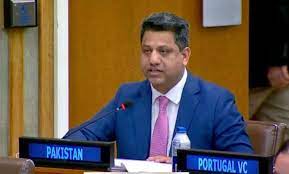Pakistan has urged the advocates of the concept of ‘responsibility to protect’, (R2P) to equally apply this global commitment to safeguard the oppressed people of Palestine and the Indian- illegally occupied Jammu and Kashmir. During his speech in the UN General Assembly on the responsibility to protect and prevent genocide, war crimes, ethnic cleansing, and crimes against humanity, the Pakistani Deputy Permanent Representative to the UN said that apart from its abuse, the concept of R2P has also led to the criticism that some powerful states failed to invoke R2P by showing hesitancy either in condemning the massive human rights violations committed by their close allies’ or by holding them accountable in the Security Council. According to him, India has denied the right of self-determination to the Kashmiri people and resorted to extra-judicial killings, forced abductions, collective punishments, and the incarceration of the political leadership of All Parties Hurriyat Conference (APHC) over the past decades.
Over seven decades ago, nations around the globe founded a global platform called the United Nations Organization (UNO) in a bid to maintain peace, end wars and resolve their mutual disputes amicably under the globally accepted framework, universal laws, and decisions of that prestigious global forum. The United Nations unanimously adopted the resolution at the 2005 World Summit to endorse a global responsibility to ensure that the international community never fails to halt the mass atrocity and crimes of genocide, ethnic cleansing, and others. That global commitment encompasses three broader prospects including the responsibility of each State to protect its populations, the responsibility of the international community to assist States in protecting their populations as well as the responsibility of the international community to protect humanity when a State is manifestly failing to protect its populations.
Although, the UN charter comprehensively covers all fundamental human rights enshrined under the Universal Declaration of human rights, however, there had been continuous maltreatment of religious and ethnic minorities in certain parts of the world that compelled the UN Human Rights Council to adopt specific resolutions to curb recurrent incidents of genocide and ethnic cleansing in certain nations. After the adoption of the R2P resolution, the international community was expected to protect those in danger, but its selective application driven by double standards, economic interests, and geopolitical considerations of powerful nations seriously undermined the credibility and genuineness of this global humanitarian doctrine.
Unfortunately, India has blatantly violated multiple UN Security resolutions and denied the right of self-determination to the Kashmiri people, waged war against innocent Kashmiris, and turned the occupied valley into an open prison by deploying over 900,000 troops to forcibly rule over 2 million people. Presently, the Indian military has employed extreme suppression, while extra-judicial killings, torture and arbitrary detention, and collective punishments are common tools for occupied forces to prolong India’s illegal and unjust occupation of Jammu and Kashmir. The UN Commission on Human Rights has comprehensively highlighted gross human rights abuses and suppression in India’s Occupied Jammu and Kashmir in the past years, while Pakistan has also recently circulated a dossier with the evidence of 3,432 war crimes committed by Indian officials in the highly militarized region in the world. Similarly, the state of Israel is unashamedly waging a crusade against unarmed Palestinians, establishing new jew settlements in West Bank and Gaza, demolishing homes, and committing unabated crimes against humanity. Ironically, the so-called champion of human rights and democracy are unable to admit or raise their voice against the grave human rights abuses of their strategic allies because of their vested interest in India and Israel.
Realistically, the global multilateral forum, universal humanitarian laws, and divine values became mere tools for the powerful nations, who selectively apply that important declarations to their advantage to achieve their political objectives, otherwise vehemently oppose the same rules when contradict their interests. These, double standards and biased attitudes of world nations had caused frustration among marginalized societies and worsened the human rights situation in occupied zones across the world particularly in long-held disputed regions of Jammu and Kashmir and Palestine. There is a dire need for the UN to rationalize its system which promotes its core objectives ends discrimination, restores peace, and resolves longstanding issues so that humanity lives in peace, prosper unrestrictedly and equally.







